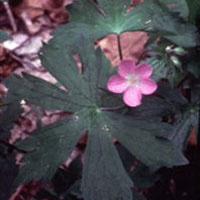Penn Herb Wellness Guide
CranesbillFind Products
 © Steven Foster
© Steven FosterParts Used & Where Grown
Cranesbill originated in North America and is sometimes grown ornamentally in a variety of flower colors. The root is primarily used in herbal medicine, but the above-ground part of the plant has also been used traditionally by herbalists.
- Reliable and relatively consistent scientific data showing a substantial health benefit.
- Contradictory, insufficient, or preliminary studies suggesting a health benefit or minimal health benefit.
- For an herb, supported by traditional use but minimal or no scientific evidence. For a supplement,little scientific support.
Our proprietary “Star-Rating” system was developed to help you easily understand the amount of scientific support behind each supplement in relation to a specific health condition. While there is no way to predict whether a vitamin, mineral, or herb will successfully treat or prevent associated health conditions, our unique ratings tell you how well these supplements are understood by the medical community, and whether studies have found them to be effective for other people.
For over a decade, our team has combed through thousands of research articles published in reputable journals. To help you make educated decisions, and to better understand controversial or confusing supplements, our medical experts have digested the science into these three easy-to-follow ratings. We hope this provides you with a helpful resource to make informed decisions towards your health and well-being.
This supplement has been used in connection with the following health conditions:
| Used for | Amount | Why |
|---|---|---|
Canker Sores | Refer to label instructions | Cranesbill is an astringent herb that can be used as a mouth rinse to soothe the pain of canker sores. The herb contains tannins that can bind up fluids and possibly relieve inflammation. |
Crohn’s Disease | Refer to label instructions | Doctors sometimes recommend this astringent herb in combination with several other herbs to sooth the digestive tract. Because it contains tannin, it may help decrease diarrhea. |
Diarrhea | Refer to label instructions | Cranesbill has been used by several North American indigenous tribes to treat diarrhea. The tannins in cranesbill likely account for the anti-diarrheal activity. |
Menorrhagia | Refer to label instructions | Astringent herbs such as cranesbill have been traditionally used for heavy menstruation. |
Traditional Use (May Not Be Supported by Scientific Studies)
The Blackfoot Indians of North America used the root of cranesbill and closely related plants to stop bleeding.1 Cranesbill has also been used by other indigenous tribes of North America to treat diarrhea.
Copyright 2025 TraceGains, Inc. All rights reserved.
Learn more about TraceGains, the company.
The information presented by TraceGains is for informational purposes only. It is based on scientific studies (human, animal, or in vitro), clinical experience, or traditional usage as cited in each article. The results reported may not necessarily occur in all individuals. Self-treatment is not recommended for life-threatening conditions that require medical treatment under a doctor's care. For many of the conditions discussed, treatment with prescription or over the counter medication is also available. Consult your doctor, practitioner, and/or pharmacist for any health problem and before using any supplements or before making any changes in prescribed medications. Information expires December 2025.


